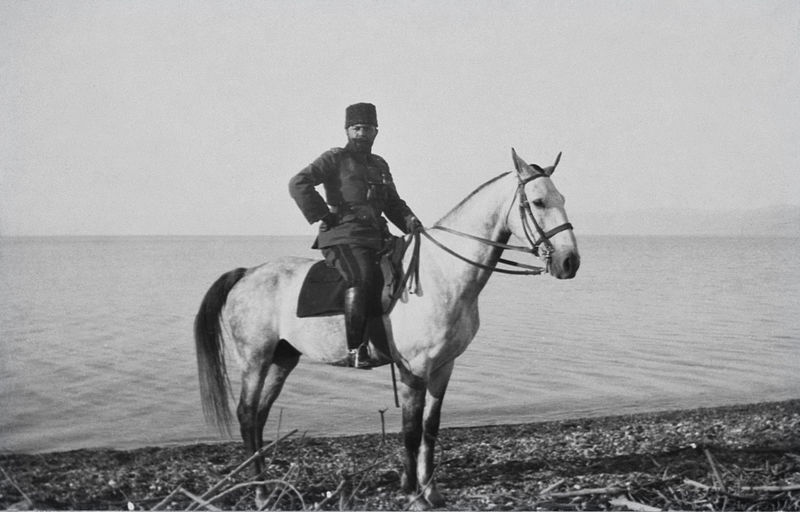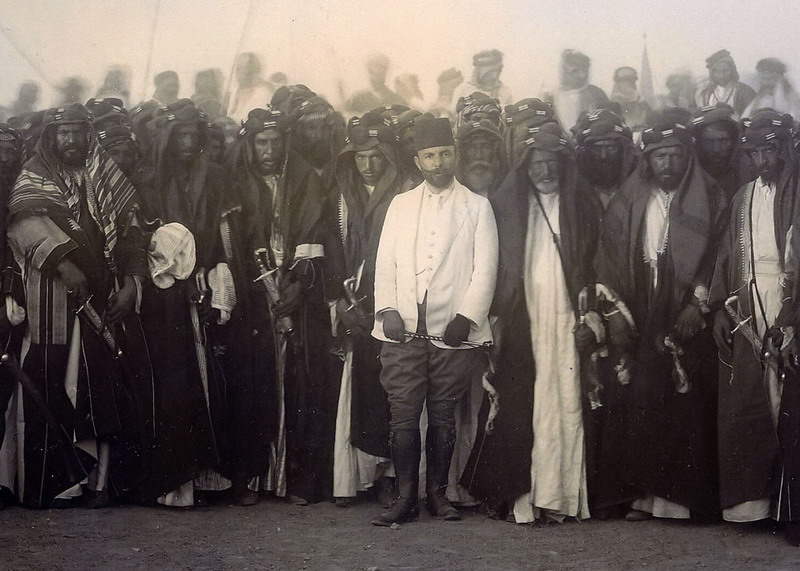<Back to Index>
- Minister of Marine and Mayor of Istanbul Djemal Pasha, 1872
PAGE SPONSOR
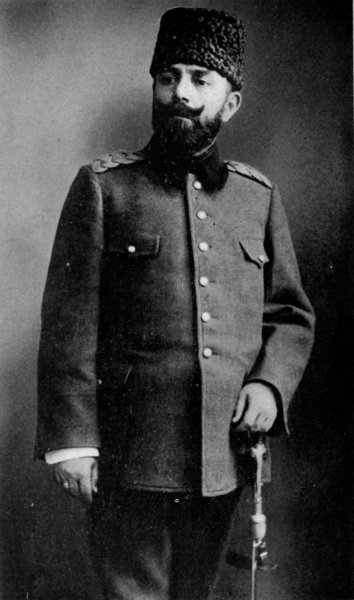
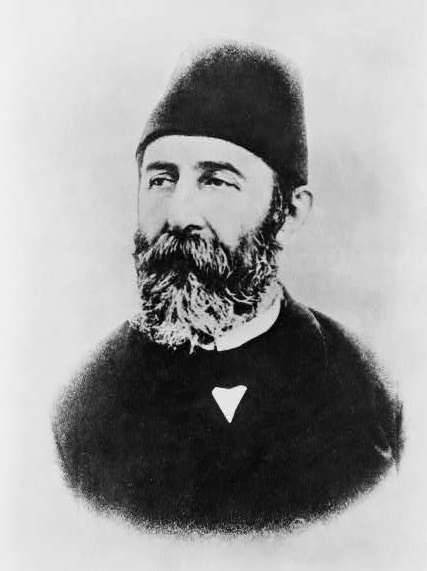
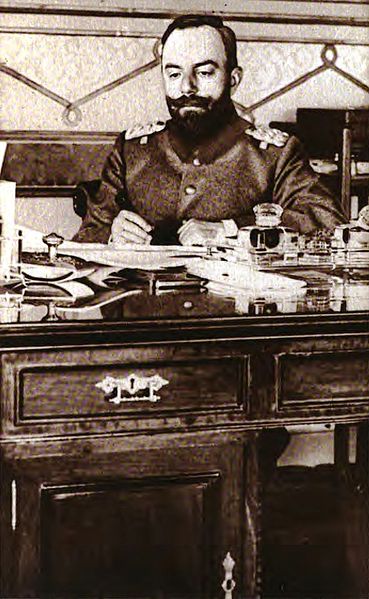
Djemal Pasha (Ottoman Turkish: جمال پاشا, modern Turkish: Cemal Paşa), born Ahmed Djemal (Ottoman Turkish: احمد جمال, Turkish: Ahmet Cemal; 6 May 1872 - 21 July 1922), was a Young Turk and member of the Three Pashas. Djemal was also Mayor of Istanbul.
He was born in Mytilene, Midilli Island (modern Lesbos) to Mehmet Nesip Bey, a military pharmacist. Between 1908 - 1918, Djemal was one of the most important leaders of the Ottoman government. He graduated from Kuleli Military High School in 1890, then from the Military Academy (Mektebi Harbiyeyi Şahane) in 1893 in Constantinople. Firstly, he served for the 1st Department of the Imperial General Staff (Seraskerlik Erkânı Harbiye), and then he worked at the Kirkkilise Fortification Construction Department bound to Second Army. In 1896, Djemal was assigned to the II Corps. Two years later, he became the staff commander of Novice Division, in Salonica.
Meanwhile, he began to sympathize with the reforms of Committee of Union and Progress (CUP) on military issues. It was in 1905, when Djemal became a major and designated as the Inspector of Roumelia Railways. In 1906 he joined the Ottoman Liberty Society. He became influential in the department of military issues of the "Committee of Union and Progress". He became a member of Board of the III Corps, in 1907. Here, he worked with Major Fethi (Okyar) and Mustafa Kemal (Atatürk).
In 1911 Djemal was appointed Governor of Baghdad. He resigned however from this duty to rejoin the army in the Balkan Wars. In October 1912, he was promoted to colonel. At the end of the First Balkan War, he played an important role in the propaganda traced by the CUP, against the negotiations with the European countries. He tried to resolve the problems that occurred in Constantinople after the Bab-ı Ali Attack (Coup of 1913). Djemal had a significant role in the Second Balkan War, and with the revolution of CUP on 23 January 1913, he became the commander of Constantinople and was appointed minister of public works. In 1914 he became the Minister of the Navy.
When Europe was divided in two blocks before the First World War, he supported an alliance with France. He went to France to negotiate an alliance with the French but failed and sided with Enver and Talaat, that favored the German side. Djemal, along with Enver and Talaat took control of the Ottoman government in 1913. The Three Pashas effectively ruled the Ottoman Empire for the duration of World War I. Djemal was one of the designers of the government’s internal and foreign policies, nearly all of which proved disastrous for the Empire.
After the Ottoman Empire declared war on the Allies in World War I, Enver Pasha nominated Djemal Pasha to lead the Ottoman army against British forces in Egypt and Djemal accepted the position. Similar to Enver, he proved unsuccessful as a military leader.
Djemal Pasha was appointed with full powers in military and civilian affairs in Syria in 1915. A provisional law granted him emergency powers in May of that year. All cabinet decrees from Constantinople related to Syria became subject to his approval. His offensives on both his first First Suez Offensive and second attacks on the Suez Canal failed. Coupled with the wartime exigencies and natural disasters that afflicted the region during these years, this alienated the population from the Ottoman government, and led to the Arab Revolt.
He was known among the local Arab inhabitants as al-Saffah, "the Blood Shedder", being responsible for the hanging of many Lebanese, Syrian Shi'a Muslims and Christians wrongly accused of treason on 6 May 1916, in Damascus and Beirut.
In his political memoirs, the leader of the "Beirut Reform Movement" Salim Ali Salam recalls the following: “Jamal Pasha resumed his campaign of vengeance; he began to imprison most Arab personalities, charging them with treason against the State. His real intent was to cut off the thoughtful heads, so that, as he put it, the Arabs would never again emerge as a force, and no one would be left to claim for them their rights … After returning to Beirut [from Istanbul], I was summoned … to Damascus to greet Jamal Pasha … I took the train …, and upon reaching Aley we found that the whole train was reserved for the prisoners there to take them to Damascus … When I saw them, I realized that they were taking them to Damascus to put them to death. So … I said to myself: how shall I be able to meet with this butcher on the day on which he will be slaughtering the notables of the country? And how will I be able to converse with him? … Upon arriving in Damascus, I tried hard to see him that same evening, before anything happened, but was not successful. The next morning all was over, and the … notables who had been brought over from Aley were strung up on the gallows.”
At the end of 1915, Djemal is said to have started secret negotiations with the Allies for ending the war (he proposed himself to take over the Ottoman government). These secret negotiations came to nothing, in part because the Allies reportedly could not agree on the future territory of the Ottoman Empire. Recent scholarship, however, has cast doubt on Djemal having ever made any such overtures to the Allies.
In the spring of 1915, while the Arab Revolt was rising, Djemal instituted strict control over Syria against Arab opponents of the Ottomans. Djemal's forces also fought against the Arab nationalists from 1916 onward. Ottoman authorities occupied the French consulates in Beirut and Damascus and confiscated French secret documents that revealed evidence about activities and names of the Arab insurgents. Djemal used this information from these documents as well as from others belonging to the Decentralization Party. Djemal believed that insurgency under French control was the main reason for his military failings. With the documents he gathered, Djemal moved against the insurgency forces which were led by Arab political and cultural leaders. This was followed by the military trials of the insurgents known as "Âliye Divan-ı Harb-i Örfisi" in which these leaders were punished.
At the end of 1917, Djemal ruled from his post in Damascus as a near independent ruler of his portion of the Empire. In 1917, following the Ottoman Army’s defeats by the British Army under General Allenby, he resigned from the 4th Army and returned to Constantinople.
In the last congress of Committee of Union and Progress held in 1917, Djemal was elected to the Board of Central Administration.
With the defeat of the empire in October 1918 and the resignation of Talat Pasha’s cabinet on 2 November 1918, Djemal fled with seven other leaders of the CUP to Germany, and then Switzerland.
A military court in Turkey accused Djemal of persecuting Arab subjects of the Empire, and sentenced him to death in absentia. But these courts were considered travesty of justice by the Allied Powers. Later, Djemal went to Central Asia, where he worked on modernization of the Afghan army. Due to the success of the Bolshevik Revolution, Djemal traveled to Tbilisi where he was assassinated, together with his secretary, on 21 July 1922 by Stepan Dzaghigian, Artashes Gevorgyan and Petros Ter Poghosyan, Armenians, as part of Operation Nemesis, in retribution for his role in the Armenian Genocide. Ahmed Djemal's remains were brought to Erzurum and buried there.
